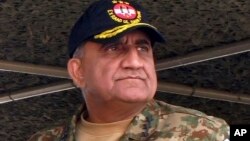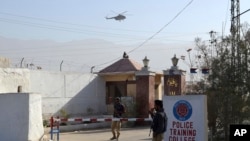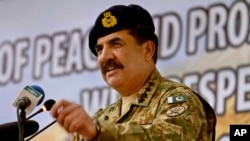In a ceremony full of pomp and show, with military drummers banging away in their multi-colored uniforms and heavily starched turbans, Pakistan’s army chief handed over the command of the world’s sixth largest army to his successor, General Qamar Javed Bajwa.
Passing the baton to a man he called “a thorough professional” and “a strong decision maker,” outgoing chief General Raheel Sharif acknowledged he was faced with a complicated security situation.
Extremist violence a major problem
Extremist violence in the country during the past decade has killed tens of thousands of Pakistanis. A military clearing operation launched in 2014 is credited with vastly improving the security situation, but attacks that continue are a stark reminder work remains.
Bajwa is also taking over at a time when tensions with Pakistan’s arch-rival India have led to the two sides regularly trading fire across the Line of Control, the de-facto border in the disputed Kashmir region in the north of the country.
Analysts say Bajwa has extensive experience of that region and its issues due to his time as commander of the army’s largest 10th Corp, which is responsible for areas around the LOC.
The other challenge he is bound to face is on the western border, with Pakistan’s other neighbor Afghanistan. Relations between the two countries have been on the decline since a temporary span of cordiality last year.
Tension with Afghanistan
Afghan President Ashraf Ghani wanted Pakistan to help mediate a peace deal with the Afghan Taliban waging an insurgency in his country. Pakistan said it tried, but could not force the Taliban against their will.
“We have played an honest role in trying to bring peace to Afghanistan,” General Sharif said during his address in the hand over ceremony.
Afghanistan claims Pakistan has continued its policy of supporting the Afghan Taliban and providing them sanctuaries to keep its influence in Afghanistan and to keep Indian influence out.
Internal friction as well
The most important challenge for the new military chief though, might be to ease the tension between Pakistan’s civilian and military leadership.
While in public all sides claim the leadership is “on the same page” and the military leadership claims it believes in the constitution and harmony between institutions, rumors and fears of a military takeover have hung over Pakistan’s capital for months before the name of the new chief was announced.
One of the reasons General Bajwa was selected, according to local media reports, was his non-attention seeking, apolitical personality. In selecting him, Prime Minister Nawaz Sharif, who has no relation to the outgoing chief Raheel Sharif, bypassed several senior generals. The practice is not uncommon in Pakistan's army and in the past has been used to appoint someone considered “safe” by various prime ministers, but that has not always worked in their favor.
General Zia ul Haq, appointed against the seniority list by former Prime Minister Zulfiqar Ali Bhutto, led a coup against him and sent him to the gallows.More recently, General Pervez Musharraf, similarly appointed by Nawaz Sharif, ousted the prime minister in 1999 and sent him into exile.
The new head of the army is replacing a chief who has achieved a cult like following in the country, with billboards requesting him to stay on and a social media campaign with #ThankyouRaheelSharif.
Outgoing general had a following
Much of this support is due to the military’s successes against militants and extremists under his command. Many in the country credit him with improved security and reduced violence.
However, critics argue he has expanded the military’s role and interfered in civilian domains without directly snatching power. He has, at least once, publicly chided the civilian government for not playing its part in implementing the National Action Plan, Pakistan’s official response to terrorist violence.
In his last public address as chief, General Sharif repeated that to deal with its internal weaknesses, including criminality and corruption, Pakistan had to implement the NAP in letter and spirit.
Tensions between civilian and military leadership reached their peak in October when a story in Pakistan’s English daily The Dawn described a heated exchange between the two sides in a national security meeting.
The controversial article, that Pakistani officials later described as fabricated, but the newspaper stood by, described the civilians as warning the military that if it did not stop supporting India-centric or Afghan-centric militant groups the country would face international isolation.
The military leadership was reportedly furious about the story and believed someone from the civilian side leaked it to the newspaper. An investigation is ongoing.Whether General Bajwa follows it up with the same vigor as the last chief may be one sign of how he wants to move forward with the country’s civilian leadership.






